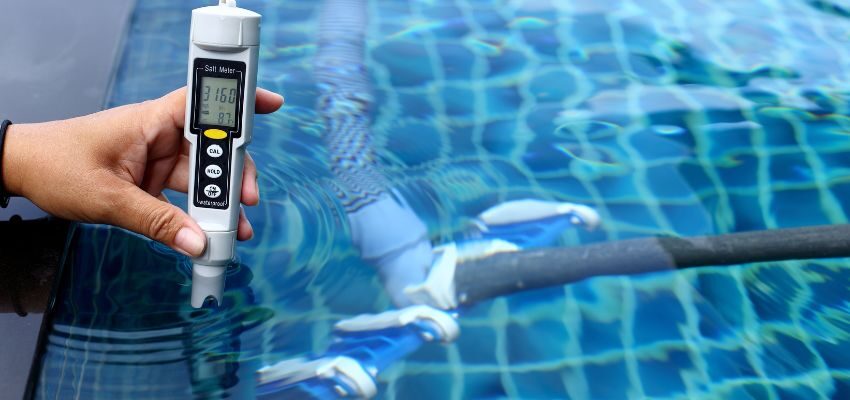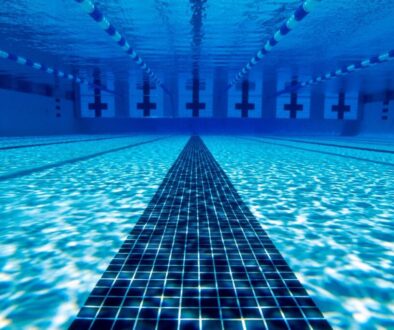Top Facts About Salt Water Pools You Need To Know

Published November 9, 2023
Each year, the realm of swimming pools witnesses the emergence of a new trend. This year, there’s a significant change in pool trends. The focus is now on salt water pools. Forget what you think about regular pools; saltwater pools are popular and inviting. But what exactly is a salt water pool, and why should you contemplate making the switch?
What Is A Salt Water Pool?
A salt water pool, as the name suggests, is a type of pool that utilizes salt water instead of chlorine. In case you’re unfamiliar, chlorine is typically employed by pool owners to clean and sanitize their swimming pools .
If you look closer at a salt water pool vs chlorine comparison, there’s a clear difference. A salt water pool uses salt instead of chlorine, which changes everything. It’s like having a natural swimming pool right in the comforts of your home.
While some may argue that this approach comes with a host of disadvantages, the reality is quite different. Pool owners who have adopted this system often find that the salt content is mild and doesn’t cause discomfort.
How Does A Salt Water Pool Work?
The way a salt water pool works has a lot to do with the salt chlorine generator—an apparatus that converts salt to chlorine. That’s the entire gimmick of a salt water pool.
The salt chlorine generator uses a low-voltage current to make the conversion possible.
It’s interesting to note that companies produce many chlorine products by electrolyzing sodium chloride, or salt. What a salt chlorine generator does is instead of you buying chlorine from the store, the machine manufactures the chlorine for you on the spot.
From that explanation alone, you can guess what benefits a salt water pool can bring to your home.
What Are The Benefits Of A Salt Water Pool?

Let’s take a look at the five most common benefits of salt water pools:
1. There’s No Strong Chlorine Smell
Salt pools have a distinct smell that can sometimes be too strong or harsh.
Though you may have been taught to believe that odor comes from chlorine, it doesn’t. Instead, it comes from chloramines, which is the result of contaminants like urine combined with chlorine.
What’s important, however, is that chlorine made by salt water pools doesn’t generate chloramines.
As a result, salt water pools tend to lack the strong chlorine smell of regular pools.
2. It’s Cheaper To Maintain
It’s no secret that chlorine is much more expensive than salt. By that merit alone, one can assume that salt water pools are cheaper to maintain. After all, you use salt rather than chlorine.
Of course, that doesn’t count the price of the salt chlorine generator, but that’s beside the point.
3. You No Longer Have To Handle Chlorine
If you’ve owned a pool before, you must know how much of a hassle it is to handle chemicals like chlorine. You have to make sure the storage is of the right temperature and it’s away from children.
With a salt water pool, those concerns are unnecessary.
4. A Salt Water Pool Is Gentler for Clothing and the Body

Most of the chlorine products you’ll find on the market are mixed with traces of chemicals that can be harsh on the body and clothes. On the other hand, the chlorine from salt chlorine generators is pure. That means there are little to no chemicals found in the mixture.
That’s why you’ll often find pool owners say salt water pools are gentler for clothing and the body.
If this has convinced you to construct a salt water pool, then it would help to learn about how you can operate a salt water pool.
How To Operate A Salt Water Pool

There are only two things you need to know to operate a salt water pool: (1) the type of salt that works in the salt chlorine generator and (2) the amount of salt you must put in the device.
For the type of salt, the following should work:
- Mined salt
- Mechanically evaporated salt
- Solar salt
For optimal results, we’d suggest using solely mined salt. In addition, you might want to stick to using salt that’s 95% pure or more. The higher the purity, the easier it’ll be for the machine.
So, by extension, you can prolong the generator’s lifespan. As for the amount of salt, we’d advise you to put 40 to 50 pounds of salt for every 2,000 gallons of water.
Now, if you’re wondering how to maintain a salt water pool, it’s not any different from regular pools. Use skimmers, clean the filters regularly, scrub the surfaces, and the like. If you don’t know how to get started with maintenance, agencies like Excel Pool and Patio Solutions can help.
How Much Is a Salt Water Pool?
The cost of installing a salt water pool ranges from $12,000 to $40,000, leading to an average price of $26,000. You can opt for a more fancy design and a more advanced generator if you have money to splurge. But if you don’t, you can settle for a mid-range generator.
Frequently Asked Questions About Salt Water Pools

1. What are the disadvantages of a saltwater pool?
Corrosion is one of the common dangers of salt water pools. Although salt is generally less harmful to your hair, skin, and eyes compared to chlorine, it can still pose potential risks to the pool itself. Keep in mind that excessive salt can cause corrosion in metal components. Therefore, it is crucial to take proper precautions to prevent any corrosion of metal parts in your pool.
2. How long do salt water pools last?
A salt chlorine generator typically has a lifespan of 3-7 years. Remember that the salt levels and maintenance significantly affect its optimal functioning duration. By diligently adhering to a maintenance routine, you can maximize the unit’s longevity.
3. Does a salt water pool system work with all types of pools?
A salt chlorine generator is most compatible with fiberglass pools. It can also be used with vinyl-lined pools that have polymer wall panels, as well as concrete pools with tiled interior surfaces. But it’s not good for vinyl liner pools with metal walls. Salt can corrode the panels and any galvanized steel anchors. Additionally, the rough nature of salt makes it an undesirable option for concrete or gunite pools with plaster as their interior surface.
4. How often should I test my saltwater pool?
It’s essential to regularly test the salt levels in a saltwater pool, ideally every week. It’s important to check pH levels, alkalinity, and stabilizer levels. By doing so, you can ensure optimal water quality and maintain a well-balanced pool environment.
Conclusion: Embracing the Salt Water Pool Revolution
In conclusion, salt water pools are revolutionizing pool maintenance and enjoyment. Salt chlorine generators make chlorine right away. This reduces smells, saves money, and is gentler on your body and clothes. Despite varying installation costs, the long-term advantages are clear. Enhance your pool experience with a salt water pool and swim smarter, healthier, and more comfortably. Start reaping the benefits today!
Hire Boca’s Favorite Pool Builders
Excel Pool and Patio Solutions is your trustworthy provider of pool services in Boca Raton. We are experts in pool and patio remodeling and can handle your resurfacing needs as well. Our technicians are vetted and trained for your guaranteed satisfaction. Get to know us by browsing our website or reaching out to us with any questions.
Contact our team today to request a free estimate for pool construction, maintenance, repairs and more.

Fact Checked By Experts
This is original content and has been diligently fact checked by our internal team of experts. Discover more about the rigorous editorial standards we uphold for our website here.

About The Author
I am Tracy Gorman, a seasoned writer from the Philippines. I possess the research and writing skills to delve into any niche. Get to know me!



